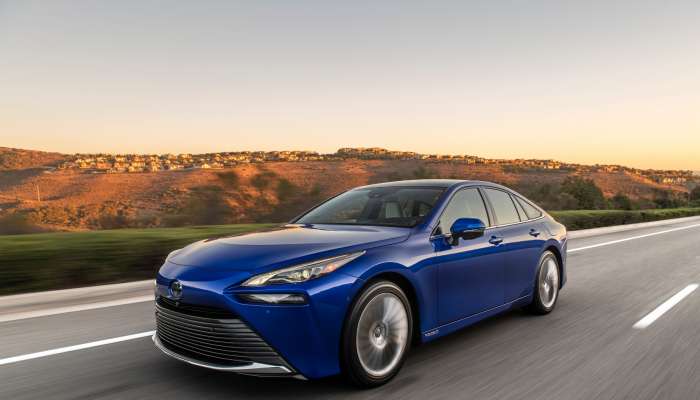
As more American motorists look to trade in their gasoline-powered cars for something greener, many will consider different forms of electric vehicles. Fuel cell electric vehicles (FCEV) may not be on everyone’s radar just yet, but they are a zero-emission electrified mobility solution that offers quick refueling time, and great driving range. These types of powertrains are expected to garner interest by everyone from casual commuters to heavy-duty commercial truck drivers in the years ahead.
So what exactly is fuel cell technology? In fuel cell electric cars, hydrogen — stored onboard in fuel tanks — combines with outside air inside a fuel cell stack to create a chemical reaction that generates electricity to power the vehicle. The only by-product of this process is water, which drops out of a hidden vent pipe beneath the car.
Believe it or not, fuel cell technology actually pre-dates the automobile by half a century and was used in American spacecraft in the 1960s, decades before car manufacturers began rolling out FCEVs. Fuel cell technology is scalable, and it can be made small enough to power a phone or large enough to power a building, or anything in between.
In essence, hydrogen-powered vehicles are “plug-less” electric vehicles. There’s no need to charge a big battery, which can take several hours in a battery electric vehicle (or BEV), even with fast charging. Instead, the FCEV driver simply fills the fuel tank with hydrogen, just as millions of drivers do every day with gas vehicles. It’s a great solution for drivers who would like an all-electric vehicle but may not have access to home charging options. With an FCEV, the fuel is non-toxic, compressed hydrogen gas rather than liquid gasoline.
Those looking to make the swap to FCEVs have options like the 2023 Toyota Mirai to consider. Now in its second generation, the Mirai XLE grade has a range rating of 402 EPA-estimated miles, and comes with all the features consumers expect today, such as engaging driving performance, a high-tech safety system, onboard navigation solutions and voice activated multimedia controls. The Mirai is currently only available in California since it is the only state at present with infrastructure to support daily FCEV commuters.
Likewise, the heavy-duty commercial transportation industry continues to explore ways to decarbonize, and fuel cell electric powertrains provide a viable solution for heavy-duty Class 8 commercial trucks. Original equipment manufacturers and operators are looking to offer fuel cell electric powertrains to help combat climate change and reduce vehicle-related emissions. Later this year, Toyota will begin production of new hydrogen-fueled powertrain kits for Class 8 trucks that include hydrogen fuel storage tanks, fuel cell stacks, batteries, electric motors and a transmission. These kits offer a viable alternative to traditional diesel powertrains used in commercial goods transportation as companies look to transition their fleets to zero-emission vehicles.
While there are still hurdles ahead in the widespread adoption of FCEVs, including building out the needed infrastructure, industry leaders are hopeful about the future. Toyota is looking to bring down costs of the technology by exploring other applications, such as stationary power generation. And hydrogen generation, much like electricity, will continue to develop more renewable sourcing options, making this a technology that will become increasingly affordable and sustainable, with options that include hydrogen produced from bio-resources or renewable electricity via electrolysis.
With these strides in mind, champions of FCEVs believe the technology will continue to gain support and recognition for the role it can play in electrified mobility solutions in an all-electric future.